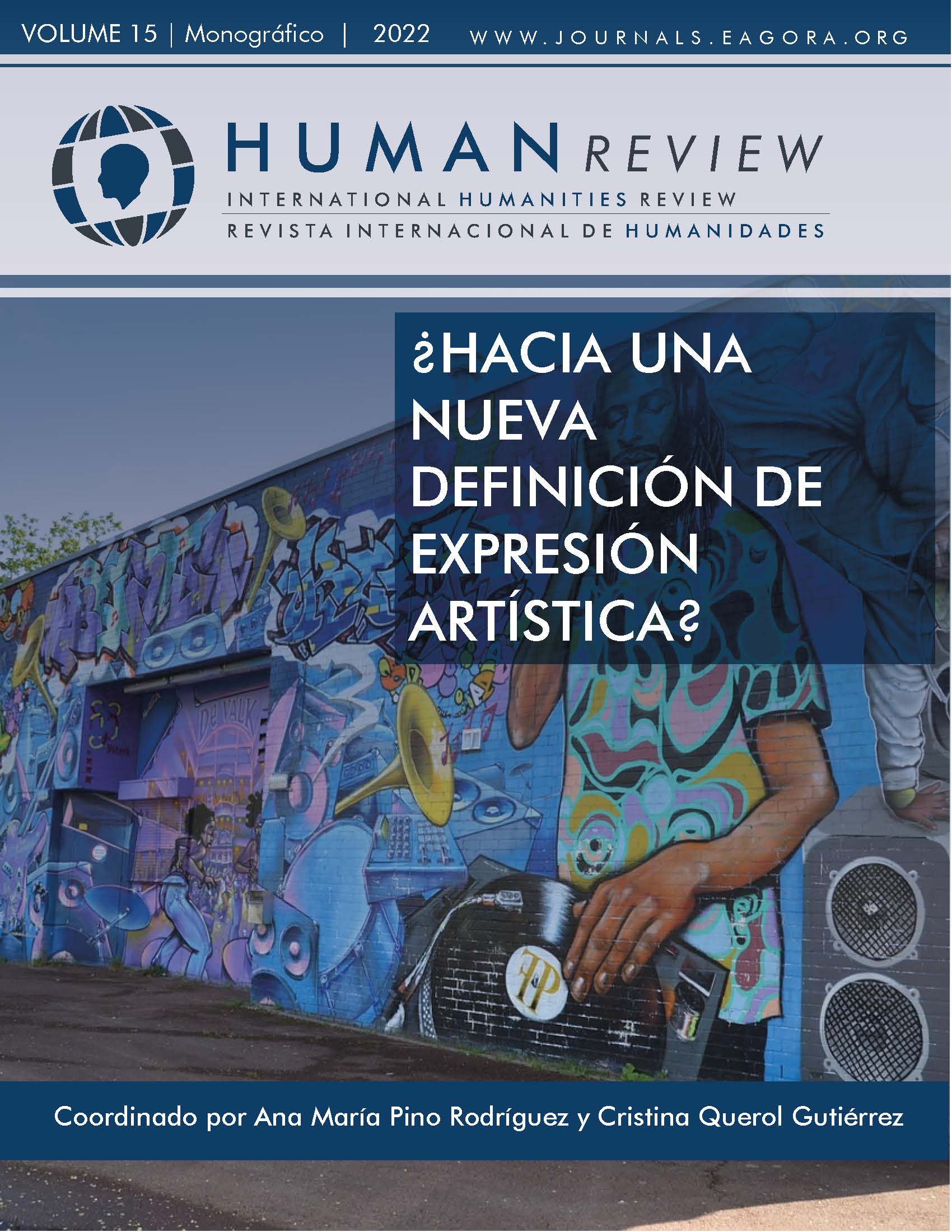Los actantes históricos en Ships in bottles de Neil Curry
DOI:
https://doi.org/10.37467/revhuman.v11.4329Palavras-chave:
Neil Curry, Ships in Bottles, Teoría del gran hombre, Microhistoria, Poesía británica siglo XXResumo
Los poemas históricos de Ships in Bottles de Neil Curry ofrecen una oportunidad de hacer una reflexión sobre la posible vigencia de la teoría del gran hombre. Contrasta la desconsideración que dicha aportación de Carlyle tiene en la actualidad con su seguimiento en otros campos, como los negocios o la política. En el caso de la poesía, los poemas seleccionados hacen ver de qué manera los grandes actantes de la historia conviven con las personas que hacen la microhistoria.
Referências
Anderson, P. (1998). The Origins of Postmodernity. Verso.
Ashliman, D. L. (2004). Folk and Fairy Tales: A Handbook. Greenwood Publishing Group.
Aurell, J. (2005). La escritura de la memoria: de los positivismos a los postmodernismos. Universidad de Valencia.
Best, J. (2008). Historical Development and Defining Issues of Constructionist Inquiry. En J. A. Holstein y J. F. Gubrium (Ed.), Handbook of Constructionist Research (pp. 41-66). The Guilford Press.
Boileau, N. (1821). A mon jardinier (pp. 399-400). Oeuvres, I. Chez Lefèvre.
Borman, T. (2018). Henry VIII and the men who made him. Hodder & Staughton.
Bownas, J. (2015). War, the Hero and the Will: Hardy, Tolstoy and the Napoleonic Wars. Sussex Academic Press.
Bray, R. (1942). Boileau: l´homme et L´oeuvre. Bolvin et compagnie.
Brown, C. B. (2011). Barack Obama as the Great Man: Communicative Constructions of Racial Transcendence in White-Male Elite Discourses. Communication Monographs, 78(4), 535-556.
Carlyle, T. (2001). On Heroes, Hero Worship, and the Heroic in History. The Electric Book Company.
Carneiro, R. L. (1981). Herbert Spencer as an Anthropologist. Journal of Libertarian Studies, 5(2), 153-210.
Cawthon, D. L. (1996). Leadership: The Great Man History Revisited. Business Horizons, 39(3), 1-4.
Cheetham, J. K. (2003). On the Trail of John Wesley. Luath Press Limited.
Cirlot, J. E. (1992). Diccionario de símbolos. Labor.
Curry, N. (1988a). Anne Hathaway Composes Her 18th Sonnet (p. 61). Ships in Bottles. Enitharmon.
Curry, N. (1988b). Boileau to His Gardener (p. 64). Ships in Bottles. Enitharmon.
Curry, N. (1988c). George Fox Crosses the Bay (p. 63). Ships in Bottles. Enitharmon.
Curry, N. (1988d). John Wesley Among the Miners (p. 65). Ships in Bottles. Enitharmon.
Curry, N. (1988e). Juan Fernandez (p. 26). Ships in Bottles. Enitharmon.
Curry, N. (1988f). Mr William Somers Will Now Entertain Us (p. 60). Ships in Bottles. Enitharmon.
Donnelly, M., & Norton, C. (2011). Doing History. Routledge.
Fox, G. (1997). The Journal of George Fox. Philadelphia Yearly Meeting of the Religious Society of Friends.
Funnel, W. (1707). A Voyage Round the World, Containing an Account of Captain Dampier´s Expedition into the South Seas in the Ship St George in the Years 1703 and 1704. W. Botham.
Garber, M. (2008). Profiling Shakespeare. Routledge.
Greer, G. (2008). Shakespeare´s Wife. Harper.
Haimowitz, M. (2012). Planet Paradise and the Law of the Jungle. Xlibris.
Hamilton, P. (1996). Historicism. Routledge.
Harris, F. (2007). The Man Shakespeare. BiblioBazaar LLC.
Hervier, M. (1948). L´Art Poétique de Boileau, étude et analyse. Mellotée.
Honderich, T. (Editor). (2005). The Oxford Companion to Philosophy. Oxford U. P.
Howell, J. (1829). The Life and Adventures of Alexander Selkirk. Oliver & Boyd.
Ivanovic, A. y Collin, P. (2006). Dictionary of Human Resources and Personnel. A & C Black.
Kuiper, B. K. (1988). The Church in History. CSI Publications.
Kurian, G. T. (2013). The AMA Dictionary of Business and Management. American Management Association.
Laurentiis, A. (2010). Universal Historiography and World History according to Hegel. En P. Liddel y A. Fear (Ed.), Historiae Mundi: Studies in Universal History (pp. 201-220). Duckworth.
Liabenow, A. (2014). The Significance of the Numbers Three, Four, and Seven in Fairy Tales, Folklore, and Mythology. Honors Projects, 418, 1-27.
Lipscomb, S. (2011). All the King´s Fools. History Today 61(8). https://www.historytoday.com/archive/all-king%E2%80%99s-fools
Lyotard, J. F. (1998). The Postmodern Condition. En K. Jenkins (Ed.), The Postmodern History Reader, (pp. 6-38). Routledge.
Marshall, P. H. (1984). William Godwin. Yale University.
Moore, H. (1826). The Life of the Rev. John Wesley, A. M. N. Bangs and J. Emory.
Mouton, N. (2019). A literary perspective on the limits of leadership: Tolstoy´s critique of the great man theory. Leadership, 15(1), 81-102.
Nickalls, J. L. (1952). The Journal of George Fox. Cambridge U. P.
Outler, A. C. (Editor). (1980). John Wesley. Oxford U. P.
Platón (1988). República. C. Eggers Lan (trad.). Gredos.
Rajan, T. (2011). The Disfiguration of Enlightment: War, Trauma, and the Historical Novel in Godwin´s Mandeville. En R. M. Maniquis y V. Myers (Eds.), Godwinian Moments: From the Enlightenment to Romanticism (pp. 172-193). University of Toronto.
Rogers, W. (1712). A Cruising Voyage Round the World. A. Bell.
Rubio Tovar, J. (2004). La vieja diosa: de la filología a la postmodernidad. Centro de Estudios Cervantinos.
Souhami, D. (2002). Selkirk´s Island: The True and Strange Adventures of the Real Robinson Crusoe. Harvest Books.
Spector, B. A. (2016). Carlyle, Freud, and the Great Man Theory more fully considered. Leadership, 12(2), 250-260.
Stringham, E. P. (2017). Hamilton´s Legacy and the Great Man Theory of Financial History. The Independent Review, 21(4), 523-533.
Tomkins, S. (2003). John Wesley: A Biography. Lion Books.
Vernon, J. (2012). Hegel, Edward Sanders, and Emancipatory History. Clío, 42(1), 27-52.
Wolosky, S. (2001). The Art of Poetry. Oxford U. P.
Downloads
Publicado
Como Citar
Edição
Seção
Licença
Os autores/as que publicam nesta revista concordam com os seguintes termos:
- Os autores/as terão os direitos morais do trabalho e cederão para a revista os direitos comerciais.
- Um ano após a sua publicação, a versão do editor estará em acesso aberto no site da editora, mas a revista manterá o copyright da obra.
- No caso dos autores desejarem asignar uma licença aberta Creative Commons (CC), poderão a solicitar escrevendo a publishing@eagora.org.









